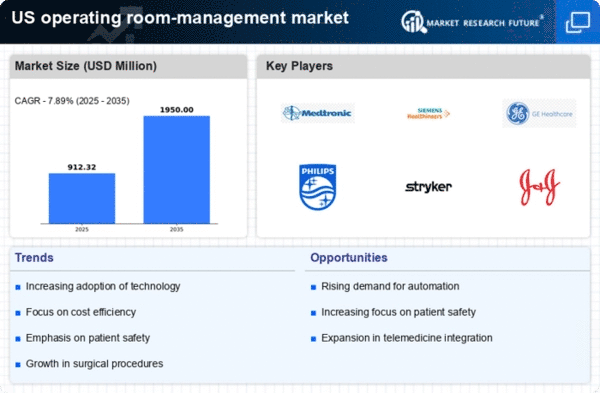Rising Surgical Volume
The operating room-management market is experiencing growth due to an increase in surgical procedures across various specialties. Factors such as an aging population and advancements in surgical techniques contribute to this trend. According to recent data, the number of surgeries performed annually in the US is projected to rise by approximately 5% over the next few years. This surge in surgical volume necessitates efficient management of operating rooms to optimize resource allocation and minimize delays. As hospitals and surgical centers strive to enhance patient outcomes, the demand for sophisticated operating room-management solutions is likely to increase, driving market growth.
Adoption of Data Analytics
The operating room-management market is increasingly influenced by the adoption of data analytics tools. These tools enable healthcare facilities to analyze operational data, identify inefficiencies, and optimize scheduling processes. By leveraging data analytics, hospitals can enhance their decision-making capabilities, leading to improved resource utilization and reduced costs. Reports indicate that facilities utilizing data-driven insights can achieve up to a 20% increase in operating room efficiency. As the healthcare sector continues to embrace data analytics, the operating room-management market is likely to see a surge in demand for solutions that facilitate data integration and analysis.
Shift Towards Value-Based Care
The transition to value-based care is reshaping the operating room-management market. Healthcare providers are increasingly held accountable for patient outcomes, prompting a shift in focus from volume to value. This paradigm shift encourages hospitals to implement efficient operating room management practices that enhance patient satisfaction and reduce readmission rates. As reimbursement models evolve, facilities that prioritize value-based care are likely to invest in technologies and processes that support this approach. Consequently, the operating room-management market may witness a growing demand for solutions that align with value-based care principles.
Increased Focus on Patient Safety
Patient safety remains a paramount concern within the operating room-management market. The implementation of stringent safety protocols and guidelines has become essential to reduce the risk of surgical errors and infections. Regulatory bodies in the US are emphasizing the need for hospitals to adopt comprehensive safety measures, which may include the integration of advanced monitoring systems and checklists. This heightened focus on safety not only improves patient outcomes but also enhances the overall efficiency of operating room management. As healthcare providers prioritize patient safety, the demand for innovative solutions that support these initiatives is expected to grow.
Integration of Telemedicine Solutions
The integration of telemedicine solutions is emerging as a key driver in the operating room-management market. As healthcare providers seek to enhance access to surgical consultations and follow-up care, telemedicine offers a viable solution. This technology allows for remote monitoring and virtual consultations, which can streamline pre-operative and post-operative processes. The US healthcare system is increasingly recognizing the benefits of telemedicine, with studies indicating that it can reduce patient wait times and improve overall satisfaction. As telemedicine continues to gain traction, the operating room-management market is likely to adapt by incorporating these solutions into their management frameworks.

















